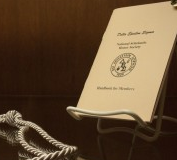Future members of St. Thomas’ Delta Epsilon Sigma chapter, the national scholastic honor society for Catholic college and university students, will not be able to take advantage tuition benefit that the society will take away for budgetary reasons.
DES allowed members to take courses beyond the normal 16-credit load during spring and fall semester without paying tuition for the extra classes. The benefit will still be available through the 2013-2014 school year, as it was advertised to students who were inducted this spring semester.
Associate Vice President for Undergraduate Studies Michael Jordan said the cut was a money saving effort in the Academic Affairs department.
“It was purely a cost saving measure, as the administration looked at the need to reduce budgets within Academic Affairs,” Jordan said. “The Business Office basically counts the tuition lost when these credits are given for free, and that cost is a budget item in Academic Affairs.”

Jordan said while the cut might hurt students financially, it will help Academic Affairs budget.
“Occasionally we have had students who have taken 24, even 28 credits in a semester. That doesn’t happen very often, but has happened,” Jordan said. “It has been a substantial benefit for some students, but again the decision is that overall, this would be the least harmful cut that could be made to the Academic Affairs budgets.”
To be eligible for the society, potential members must have junior standing and at least a 3.75 GPA, while seniors are eligible with a GPA of 3.5. Members also benefit from having no restriction on class loads.
Junior Chris Gelke said as a member of DES, he is disappointed in the cut, and has taken advantage of the tuition benefit.
“I’m very disappointed,” Gelke said. “I personally benefitted from it. I was able to pick up another language because I’m really interested in that, and I was able to do that because of the tuition credit that DES provides.”
Chapter Vice President junior Keegan Bragg said while he was “surprised” at the cut, he understands that budget cuts are necessary. Bragg said the cut actually puts St. Thomas’ chapter on the same page as other Catholic colleges with DES chapters.
“The other Catholic schools around here and the nation don’t offer free tuition over 16 credits either,” Bragg said. “We are kind of going into accordance with other schools around here.”
Junior Madeline Anderson said while she is not a member of DES, she thinks the cut isn’t ideal.
“It’s a good incentive,” Anderson said. “I don’t know a lot of people who would utilize it; the payout couldn’t have been that large.”
Gelke said other schools offer across the board tuition benefits beyond the 16 standard credits.
“I think a lot of other colleges have that on their own, not even as a part of a specific group, and so I think that it’s really good for promoting learning for the sake of learning, which is what a liberal arts institution should be doing,” Gelke said.
Jordan said the cut is “unfortunate,” but the tuition benefit doesn’t define DES.
“It’s not an essential feature of DES in any way. It’s an honor society that’s meant to recognize academic achievement,” Jordan said. “There are activities that DES engages in, so it was an additional privilege that a few students have earned that is now being eliminated.”
Gelke said without the tuition benefit, he doesn’t think he would have joined DES.
“That was the main benefit was that if you took over 16 credits you would receive free classes,” Gelke said. “So besides being on a resume and a luncheon or banquet twice a year … the organization doesn’t really do anything else.”
Anderson said she was offered a DES membership but didn’t accept.
“The email they sent didn’t seem too official, and I thought it would be a waste of my money,” Anderson said. “I didn’t really think it would pay off to have on my resume, but maybe that’s just because I’m ill informed.”
Bragg said it is too early to tell whether or not the cut will affect DES membership numbers in the future.
“There are other benefits that DES can offer … it’s hard to say whether this will affect us or not, so we’ll just have to see,” Bragg said.
Gabrielle Martinson can be reached at mart5649@stthomas.edu.




I’m going to have to agree with Chris Gelke on this one, I honestly would not have joined DES it weren’t for the fact that they pay up to 4 credits beyond the normal 16 credit course load (at least when I joined in Spring 2013). I plan to get a minor out of that benefit and I’m really disappointed that this option is being cut for future students. So many students work hard to get a 3.75 GPA and beyond, and this is a huge incentive for those types of students. While other DES chapters at Catholic institutions may be a more visible presence on campus in terms of activity — my main association with DES is the tuition benefit specifically. DES is going to have to work hard to justify why future students should join if not for the tuition benefit.
I was also disappointed and surprised to hear this news. While I never took advantage of this opportunity, my sister has and it has benefited her academic goals immensely. I know that in the past DES members were given other benefits as well that have been taken away. If there is no longer a tuition benefit, what is the point of joining DES? It’s $70 for a pin and an asterisk next to your name at graduation. I think the administration needs to consider cutting the budget elsewhere, and perhaps reducing the number of redundant positions and departments in the university administration itself. This is not the correct decision.